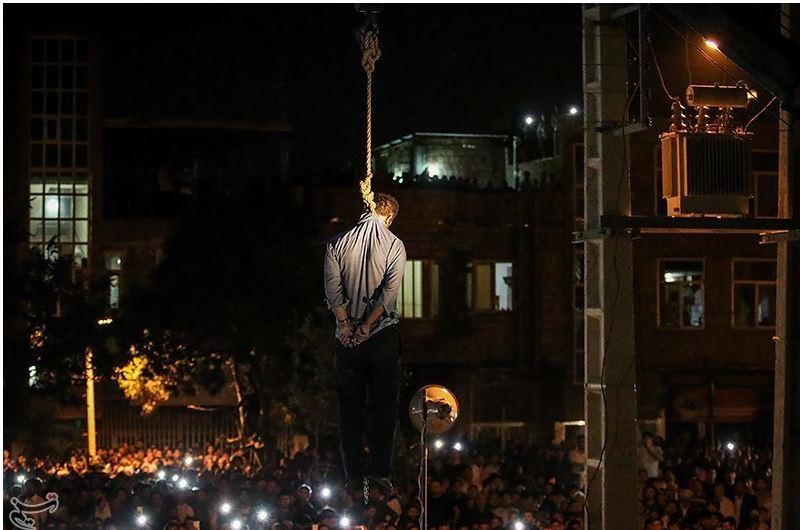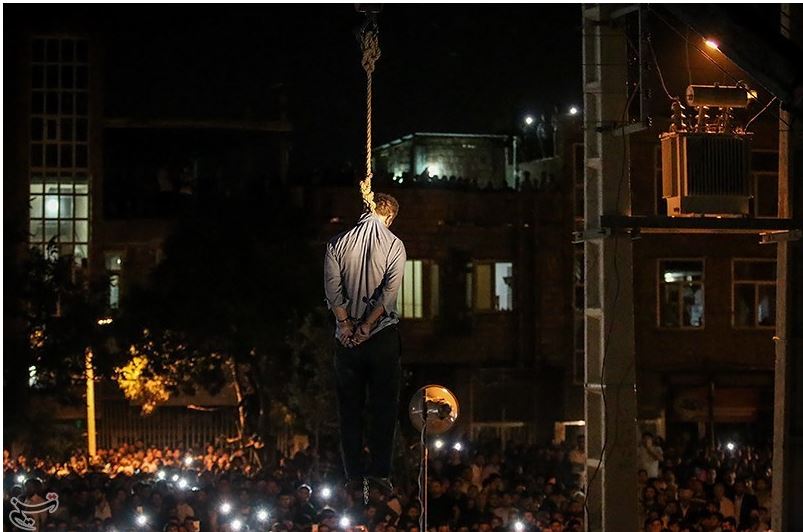

Photo Credit:Iran hanging.
Tasnim News Agency via wikim cc4
What was with all the gushy condolences from the U.S. and the rest of the West upon learning of the Butcher of Tehran's death in a chopper crash?
“My condolences.”
“I’m so sorry for your loss.”
“My sympathies.”
“May he rest in peace.”
Raised as we are in Western civilization, we have an instinctive response when we hear of someone’s death, whether by natural causes, by accident, or even by murder. We think first of his or her family and friends, we naturally empathize with their sorrow, and we wish them these words and more, heartfelt and seriously.
We would be sad if a loved one died, and we assume that everyone must have loved ones. Our sympathy is automatic.
One wouldn’t think this would be a problem, but in politics, and therefore in the press as well, it can be – because there are people who have no loved ones, and with good reason; there are people who will not, and more importantly should not, be missed.
On Saturday, May 19, Ebrahim Raisi, allegedly a direct descendent of their “prophet” himself, was killed in a helicopter crash in East Azerbaijan, a province in Iran. A few other officials went down with the chopper as well, but Ebrahim Raisi is the one who made the news, because at the time of his death, he was serving as president of Iran.
As a result, other heads of state and their staffs started issuing the perfunctory letters of condolence. “We extend our sympathies to the people of Iran on the loss of their president” – in various languages and varying levels of saccharine prose.
Even the United Nations.
Even the United States.
While President Raisi should have only been a household name in world politics since winning his presidential election in 2021, he was actually one of the few names in Iranian politics who had been well known for decades. He held numerous other government posts over the years – he served as Attorney General, as Chief Justice, as Prosecutor-General, all sorts of high positions – but most importantly, he was one of the chiefs of a massive, lethal purge of political prisoners known as the 1988 executions.
In this particularly shocking show of utter brutality, Raisi and his cohorts arranged the killings of thousands of their fellow Iranians in an assembly-line manner. Using forklift trucks to raise and hang the condemned in groups of six every half-hour, they hanged thousands of people over the second half of 1988.
Commissioned on the orders of the late Ayatollah Khomeini, this purge involved prolonged mass torture in a clear display of sheer tyrannical power. Estimates of the dead vary, with the bare official minimum set between 2,800 and 4,000 killed, but many global sources estimate the number of victims of this purge alone in the tens of thousands.
This 1988 incident earned Ebrahim Raisi a distinctive sobriquet both at home and abroad: he is known everywhere as the Butcher of Tehran.
He didn’t improve with age.
He was a hanging judge, an enforcer of Sharia law, as one would expect from a successful Iranian politician in the age of the mullahs. Raisi supported Putin’s invasion of Iran; he supported the Houthi terrorists in Yemen. Raisi has championed nuclear bomb technology for Iran; he signed long-term deals with Red China. He denounced the Abraham Accords between Israel and several muslim nations at the end of the Trump years; he cheered Hamas in its atrocity-filled invasion of Israel on October 7, and he called for Hamas to take over Israel in an expanded Gaza-based state, “from the River to the Sea.”
In short, to put it mildly, Ebrahim Raisi was an enemy. Of the U.S.A. and our allies, even of the people of his own country.
We should recall, for a moment, what a wonderful, progressive country (in the best way) Iran was before the 1979 revolution. Iran under the Shah was a modern nation, with growing prosperity and so many Western values. From education to entrepreneurship, from fashion to human rights, Iran under the Shah’s rule was a shining example of the best of modernization.
Then came the imposition of the tyranny of the mullahs, and it has been a truly brutal regime, a sponsor of terrorism, a continuous threat to the world, for 45 years now.
How should we react to his death?
On the one hand, we have this Western sensibility; we offer condolences by rote, we never think of doing otherwise. And we have this cultural inner governor that reminds us to “never speak ill of the dead.” Even if there are complaints to discuss, we feel that this is the wrong time for that. Don’t kick them when they’re down, don’t attack their memories while their loved ones are missing them.
This is how we are conditioned to think. It’s our culture. Even our politicians and their staffs. Even our newspapers and our television anchors. Don’t criticize the dead, now, of all times.
But on the other hand…
Shouldn’t we be embarrassed by hypocrisy? Shouldn’t we be uncomfortable speaking well of someone who hated us and our views, hated our history and our freedom, hated our system and our allies’ systems too, all his life?
And more importantly, if this is the only time his name will have the attention of the world, isn’t this the right time, the perfect time, to tell the truth about him, while he and his record are in the news?
Ebrahim Raisi killed thousands, maybe tens of thousands, maybe even more. Ebrahim Raisi contributed to the spread of terrorism, the spread of antisemitism, and the spread of islamic theocratic rule across the world.
And as the presumed likely successor to his aging sponsor, the 85-year-old Ayatollah Ali Khameini, Ebrahim Raisi was set to bring even more fiery rhetoric and homicidal policy to the dictatorial power of the office of the Supreme Leader of Iran.
If he had lived to see it.
Which, mercifully, he didn’t.
Why didn’t the United Nations, allegedly formed to foster peace in the world, say this? Why didn’t the Biden-Harris regime, ostensibly the representatives of the people of the United States, say this?
It is right to be respectful when regular folks die; it’s critical for a civil society.
But, equally critical for a civil society is the need to educate the electorate, to take every opportunity to ensure that the people – the voters – understand that there is real evil in the world, and that it is already in power, demonstrably so, in far too many countries in the world.
If we know that monsters such as Ebrahim Raisi can win and hold political office, then perhaps we’ll be more careful to avoid empowering such people in our own elections, over here.
But if we never know that, far away, such killers do run for office, and win, and then use such office to legalize and impose mass torture, mass domination, and mass murder – then we may not realize that it is a risk here as well, and we may sleepily allow such candidates to take power here.
Of all the times, a presidential election year is as important a time as any to take advantage of such opportunities, to awaken an uninformed and perhaps oblivious public.
John F. Di Leo is a Chicagoland-based international transportation manager, trade compliance trainer and speaker. A one-time Milwaukee County Republican Party chairman, he has been writing a regular column for Illinois Review since 2009. Read his book on vote fraud (The Tales of Little Pavel) and his political satires on the current administration (Evening Soup with Basement Joe, Volumes I, II, and III).
Image: Tasnim News Agency, via Wikimedia Commons // CC BY-SA 4.0






